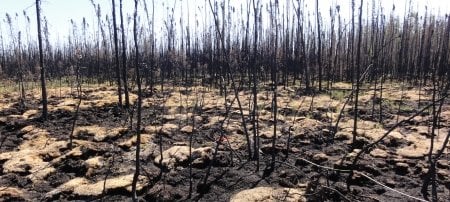Grad Student Adventure: Russians, Permafrost, Hitching a Military Ride

Chris Johnson had never been out of the US. In fact, he’d never been on a plane until last winter. But he made up for it big time—by flying to Antarctica to conduct research.
Johnson is working on a master’s degree in forest ecology and management at Michigan Technological University. His advisors are Tom Pypker and Rod Chimner, assistant professors in the School of Forest Resources and Environmental Science.
Johnson left Houghton for Punta Arenas, Chile, on a blustery January morning. Five flights and 52 hours later, the Michigan Tech graduate student landed on King George Island just off the Antarctic Peninsula.
Traveling to King George Island is not exactly a trip to the beach. The offshore island, which scientists believe drifted from the South American continent about 450 miles south to its present location, doesn’t have scheduled airline service. Military cargo planes from the nine countries that have scientists there drop off supplies and the occasional passenger—when the unpredictable weather permits them to land.
Johnson’s original flight from Chile to Antarctica was cancelled. He tried to book passage on a Uruguayan military plane chartered by a shipping company. “The price went up three times in four days,” he says. “We ended up paying $1,400.”
Riding a bulky, thunderous military cargo plane is an experience everyone should have, adds. “There are no safety videos, seatbelt checks or even bathrooms. This plane is all business.”
A cramped, two-and-a-half hour flight crossed the Drake Passage, known for some of the worst weather in the world. But they made it, landing on a short gravel runway maintained by the Chilean military.
They were billeted at the Russian base, “where nothing was written in English,” Johnson recalls. Loaded down with three backpacks, he began slogging through deep, wet snow and up a rocky, muddy slope to their quarters, which the visiting researchers soon dubbed “the Mountain Lodge.” Out of breath and struggling to remain upright in the blustery winds, Johnson took a 360-degree look around.
“I found myself absolutely awestruck,” he says. “Vast snow fields covered the dark raw earth and mountains; mosses and lichens struggled for life atop rocks and bare soil; the wind blew whitecaps across the turquoise sea, and cold saturated air blew through fog, creating a chill different from anything I had ever experienced.”
They spent eight days in Antarctica studying the carbon dynamics of recently exposed permafrost. Analyzing the carbon dioxide leaving and entering the soil, he and his colleagues from the Association of Polar Early Career Scientists were looking for lichen, small plants, microbial communities—signs of life.
The barren land was forested 50 million years ago, Johnsone explains, and soil can be found in the permafrost when the summertime temperature rises to a relatively warm 3 or 4 degrees Celsius (37 to 39 degrees Fahrenheit). January, of course, is mid-summer in Antarctica, south of the Equator.
Johnson ‘s “carry-on luggage” consisted of $11,000 worth of heavy equipment, a jumble of wires and machinery stuffed into two large carry-on bags. “Mostly, the airport security people just laughed,” he recalls.
But the trip back was considerably more challenging. Snagging a ride on a Chilean military plane—this time at a cost of only $450—Johnson and his colleagues were the last ones out. Then the weather closed in, and a group of 20 Chinese scientists right behind them was unable to leave the island.
Also, the research team was taking soil samples for analysis back in the US. “I think you might be better off trying to carry radioactive materials through security,” Johnson says with a smile. They wound up having to ship the frozen soil samples home to their lab, which the US Department of Agriculture had already inspected to make sure the facility was equipped to hold and handle the soils safely.
Johnson’s entire time in Antarctica wasn’t spent digging in permafrost. “We heard lectures from Antarctic scientists, trekked along a glacier, counted elephant seals, rode across Maxwell Bay in a Zodiac inflatable military boat,” he reports.
“One of the highlights for me was hiking along the moraine—the earth and stones deposited by a glacier—laden with clay, loose stones and ice,” Johnson says. “Its steep and fragile peaks gave way underfoot, making it challenging to keep balanced while soaking in the magnificent sights offered by this high point. Along the base of the glacier, we were able to see piles of 30,000-year-old marine shells and thick deposits of pure volcanic ash.”
Every day of the trip was an adventure entirely outside his previous experience. “Antarctica is a land of pure earth,” he says. “It is the only continent where Homo sapiens have not settled in large numbers to alter the ecosystems. Problems do exist, though. Glaciers and sea ice are melting at record speeds. There is no denying that northern Antarctica is experiencing extreme climate shifts. It is vital for scientists to continue traveling to Antarctica to study these changes. The climate of the entire earth is regulated in part by Antarctica.”
Most of the funding for Johnson’s Antarctic expedition came from his own pocket. He has applied for a new grant for students to participate in “outside educational experiences,” so he hopes there may be another, equally exciting excursion in his future.
Michigan Technological University is an R1 public research university founded in 1885 in Houghton, and is home to nearly 7,500 students from more than 60 countries around the world. Consistently ranked among the best universities in the country for return on investment, Michigan's flagship technological university offers more than 185 undergraduate and graduate degree programs in science and technology, engineering, computing, forestry, business, health professions, humanities, mathematics, social sciences, and the arts. The rural campus is situated just miles from Lake Superior in Michigan's Upper Peninsula, offering year-round opportunities for outdoor adventure.




Comments